|
|
|
Sort Order |
|
|
|
Items / Page
|
|
|
|
|
|
|
| Srl | Item |
| 1 |
ID:
080573
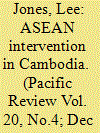

|
|
|
|
|
| Publication |
2007.
|
| Summary/Abstract |
Despite their other theoretical differences, virtually all scholars of the Association of Southeast Asian Nations (ASEAN) agree that the organization's members share an almost religious commitment to the norm of non-intervention. This article disrupts this consensus, arguing that ASEAN repeatedly intervened in Cambodia's internal political conflicts from 1979 to 1999, often with powerful and destructive effects. ASEAN's role in maintaining Khmer Rouge occupancy of Cambodia's UN seat, constructing a new coalition government in exile, manipulating Khmer refugee camps and informing the content of the Cambodian peace process will be explored, before turning to the 'creeping conditionality' for ASEAN membership imposed after the 1997 'coup' in Phnom Penh. The article argues for an analysis recognizing the political nature of intervention, and seeks to explain both the creation of non-intervention norms and specific violations of them as attempts by ASEAN elites to maintain their own illiberal, capitalist regimes against domestic and international political threats.
|
|
|
|
|
|
|
|
|
|
|
|
|
|
|
|
| 2 |
ID:
083822
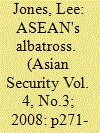

|
|
|
|
|
| Publication |
2008.
|
| Summary/Abstract |
Following the abortive "Saffron Revolution" of autumn 2007, Burma's ASEAN partners were subject to the timeworn criticism that the grouping persistently fails to act against its pariah member due to its near-religious adherence to the norm of non-interference. Conversely, this paper argues that ASEAN's policy towards Burma has never been one of strict non-interference, but has always been premised on the claim that ASEAN can encourage political change there. Moreover, the non-interference principle has come under increasing pressure since the Asian financial crisis. The article tracks the evolution of ASEAN's policy, from the adoption of constructive engagement in 1988, through the gradual frustration of ASEAN's designs, to its present position of critical disengagement, arguing ASEAN's failure to take a stronger line has less to do with any binding "norms" than with the interests of the region's predominantly illiberal elites and the grouping's increasing difficulties in achieving meaningful consensus
|
|
|
|
|
|
|
|
|
|
|
|
|
|
|
|
| 3 |
ID:
097775
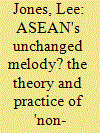

|
|
|
|
|
| Publication |
2010.
|
| Summary/Abstract |
The Association of Southeast Asian Nations (ASEAN) is widely supposed by theorists and commentators of many persuasions to have elevated the principle of absolute non-interference in the internal affairs of states into a central pillar of Southeast Asian regionalism. Non-interference is also criticised for retarding ASEAN from taking meaningful action over economic crises, problematic members like Myanmar, and transnational security threats. This article critiques this consensus, arguing that the norm has never been absolute, but has rather been upheld or ignored in line with the interests of the region's dominant social forces. While the principle formally remains in place despite such challenges and serious instances of violation, it is now subject to competing demands and contestation.
|
|
|
|
|
|
|
|
|
|
|
|
|
|
|
|
| 4 |
ID:
106462
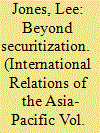

|
|
|
|
|
| Publication |
2011.
|
| Summary/Abstract |
Since the late 1980s, the scope of security policy has widened dramatically to encompass a wide range of 'non-traditional' threats. Southeast Asian states have superficially appeared to embrace this trend, broadening their security discourse considerably. However, they are also often criticized for failing to translate this discursive shift into concrete regional cooperation to tackle these new threats. This article critiques the dominant theoretical framework used to explore the widening of states' security agendas - the Copenhagen School's 'securitization' approach - as unable to account for this gap due to its fixation on security discourse rather than practice. Drawing on state theory and insights from critical political economy, the article argues that the scope of regional security policy is better accounted for by the distinctive nature of state-society relations within Southeast Asia. The argument is advanced using case studies of Southeast Asian states' policies toward Burma, environmental degradation, and border conflicts.
|
|
|
|
|
|
|
|
|
|
|
|
|
|
|
|
| 5 |
ID:
173937
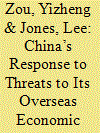

|
|
|
|
|
| Summary/Abstract |
Chinese firms have acquired enormous overseas interests since 2000. As relative latecomers to global markets, they often invest in territories subject to high political risk, which is often heightened by poorly regulated Chinese practices. This article describes these risks to China’s growing overseas economic interests and explores China’s response to them. First, the Chinese party-state is gradually softening its insistence on ‘non-interference’, intervening to secure Chinese economic interests overseas. Second, Chinese actors are seeking to cultivate greater consent among social forces in key states. This partial convergence with the practices of other major capitalist states has important implications for debates on China’s rise. These arguments are illustrated through a case study of Chinese engagement in Myanmar after 2011.
|
|
|
|
|
|
|
|
|
|
|
|
|
|
|
|
| 6 |
ID:
104347
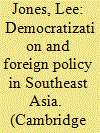

|
|
|
|
|
| Publication |
2011.
|
| Summary/Abstract |
Recent democratic transitions in Southeast Asia raise the question as to how we should theorize the relationship between democratization and foreign policy. Many scholars assume that more 'democratic' Association of Southeast Asian Nations (ASEAN) members pursue more 'liberal' policies than their less-democratic counterparts, but surprisingly little theoretical work investigates the connection. This article argues that such investigations tend to crumble under close scrutiny. Instead, it offers an alternative framework based on an analysis of how different socio-economic interests contend to shape foreign policy in ASEAN states and how these interests are able to organize politically to impose their preferences. The case study of the ASEAN Inter-Parliamentary Myanmar Caucus, a regional network of legislators campaigning for liberal-interventionist policies on Myanmar, shows how it is these forces, and not the mere presence or absence of formally democratic institutions, that govern the political space available to those seeking to transform ASEAN states' policies.
|
|
|
|
|
|
|
|
|
|
|
|
|
|
|
|
| 7 |
ID:
177636
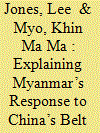

|
|
|
| 8 |
ID:
189240
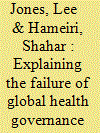

|
|
|
|
|
| Summary/Abstract |
Global health governance (GHG) was one of COVID-19's earliest victims. Soon after the novel coronavirus escaped China, the World Health Organization (WHO) was marginalized, and the International Health Regulations became practically irrelevant, as nations adopted uncoordinated, ad hoc responses. Existing explanations of GHG's collapse are largely utopian, criticizing states for failing to empower the WHO with sufficient supranational authority. This misunderstands how GHG was supposed to work in the first place and hence mistakenly diagnoses the causes of failure. We argue that COVID-19 exposed the pathologies of an entire, neoliberal approach to global governance: metagovernance and state transformation. In this approach, international organizations are hollowed out and their role shifts to metagovernance—developing and disseminating ‘best practice’ policies, institutions and rules for states to embed domestically. Such global regimes' efficacy, therefore, depends on states' capacity to enforce global disciplines. However, nation-states are also hollowed out by neoliberal strictures, undermining practical implementation. Consequently, GHG was failing long before COVID-19, leaving the system dependent on ad hoc interventions by dominant states. With the latter also affected by COVID-19, GHG was left in disarray. Reform proposals should therefore focus less on global institutions and rules and more on building domestic capabilities.
|
|
|
|
|
|
|
|
|
|
|
|
|
|
|
|
| 9 |
ID:
148306
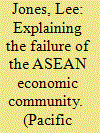

|
|
|
|
|
| Summary/Abstract |
All reliable indicators suggest that ASEAN's (Association of Southeast Asian Nations) Economic Community (AEC) will not be successfully established by its 2015 deadline. Why? Against technocratic, realist and constructivist accounts, this article offers an explanation rooted in the political economy of ASEAN's member-states. Economic liberalisation agreements promote the rescaling of economic governance, involving regulatory changes that may radically redistribute power and resources. Consequently, they are heavily contested between coalitions of social and political forces, without outcomes reflecting the outcome of these struggles. The argument is demonstrated by exploring the uneven sectoral liberalisation achieved under the AEC, the constrained integration of ASEAN's energy markets, and the limited deregulation of skilled labour migration.
|
|
|
|
|
|
|
|
|
|
|
|
|
|
|
|
| 10 |
ID:
123618
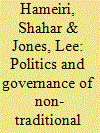

|
|
|
|
|
| Publication |
2013.
|
| Summary/Abstract |
The international security literature has recently observed the growing "securitization" of issues outside the traditional concern with interstate military conflict. However, this literature offers only limited explanations of this tendency and largely neglects to explain how the new security issues are actually governed in practice, despite apparent "securitization" leading to divergent outcomes across time and space. We argue that the rise of non-traditional security should be conceptualized not simply as the discursive identification of new threats but as part of a deep-seated historical transformation in the scale of state institutions and activities, notably the rise of regulatory forms of statehood and the relativization of scales of governance. The most salient feature of the politics of non-traditional security lies in key actors' efforts to rescale the governance of particular issues from the national level to a variety of new spatial and territorial arenas and, in so doing, transform state apparatuses. The governance that actually emerges in practice can be understood as an outcome of conflicts between these actors and those resisting their rescaling attempts. The argument is illustrated with a case study of environmental security governance in Southeast Asia.
|
|
|
|
|
|
|
|
|
|
|
|
|
|
|
|
| 11 |
ID:
167686
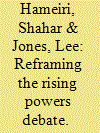

|
|
|
|
|
| Summary/Abstract |
The volume that we introduce breaks with the prevalent tendency in International Relations (IR) scholarship to treat rising powers (such as China, Russia, India and Brazil) as unitary actors in international politics. Although a neat demarcation of the domestic and international domains, on which the notion of unitary agency is premised, has always been a myth, these states’ uneven integration into the global political economy has eroded this perspective’s empirical purchase considerably. Instead, this collection advances the concept of ‘state transformation’ as a useful lens through which to examine rising power states’ foreign policymaking and implementation. State transformation refers to the pluralisation of cross-border state agency via contested and uneven processes of fragmentation, decentralisation and internationalisation of state apparatuses. The volume demonstrates the significance of state transformation processes for explaining some of these states’ most important foreign policy agendas, and outlines the implications for the wider field in IR.
|
|
|
|
|
|
|
|
|
|
|
|
|
|
|
|
| 12 |
ID:
136952
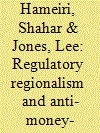

|
|
|
|
|
| Summary/Abstract |
With the intensification of the Financial Action Task Force's (FATF's) worldwide campaign to promote anti-money-laundering regulation since the late 1990s, all Asian states except North Korea have signed up to its rules and have established a regional institution—the Asia/Pacific Group on Money Laundering—to promote and oversee the implementation of FATF's 40 Recommendations in the region. This article analyses the FATF regime, making two key claims. First, anti-money-laundering governance in Asia reflects a broader shift to regulatory regionalism, particularly in economic matters, in that its implementation and functioning depend upon the rescaling of ostensibly domestic agencies to function within a regional governance regime. Second, although this form of regulatory regionalism is established in order to bypass the perceived constraints of national sovereignty and political will, it nevertheless inevitably becomes entangled within the socio-political conflicts that shape the exercise of state power more broadly. Consequently, understanding the outcomes of regulatory regionalism involves identifying how these conflicts shape how far and in what manner global regulations are adopted and implemented within specific territories. This argument is demonstrated by a case study of Myanmar.
|
|
|
|
|
|
|
|
|
|
|
|
|
|
|
|
| 13 |
ID:
124136
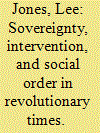

|
|
|
|
|
| Publication |
2013.
|
| Summary/Abstract |
This article explores how sovereignty and (non-)intervention are implicated in the (re)production of specific social orders. Sovereignty and the non-interference principle circumscribe 'domestic' politics from 'the international', defining who is legitimately included or excluded from the struggles that determine political and social orders. State managers seek to admit forces and resources favourable to the order they are seeking to create, whilst excluding those deleterious to it. In revolutionary periods, however, these attempts to 'cage' social relations often crumble as transnational forces engage in fierce, multifaceted conflicts overlapping territorial borders. In such circumstances, both norms of non-interference and practices of intervention may be used by dominant forces to help contain the spread of sociopolitical conflict and to strengthen their hand in the struggle to (re)define social order. Sovereignty regimes are thus shaped by the strategies and ideologies of the various social groups locked in conflict at a particular historical moment. This argument is illustrated through the case of Cold War Southeast Asia, where sovereignty and intervention were both used to stabilise capitalist social order and curtail transnational, radical threats from below.
|
|
|
|
|
|
|
|
|
|
|
|
|
|
|
|
| 14 |
ID:
168803
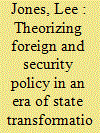

|
|
|
|
|
| Summary/Abstract |
There is growing evidence of the transformation of statehood under globalization, specifically, the fragmentation, decentralization and internationalization of state apparatuses. While most pronounced in Western Europe, these trends are observable worldwide. Foreign policy analysis (FPA) and international relations (IR) theory have fundamentally failed to keep pace with this epochal development. These traditions still largely understand states as coherent actors whose territorial borders “contain” sociopolitical relations and where identifiable “decisions” produce unified policies and strategies. This article challenges this shortcoming, offering a new theorization of foreign and security policy-making and implementation that foregrounds state transformation and the rise of regulatory statehood. The theory is developed and illustrated using the case of China, which IR/FPA scholars typically depict as the quintessential authoritarian, “Westphalian,” unitary state, but which has in fact undergone enormous state transformation since 1978. The article argues that the concept of a “Chinese-style regulatory state” can help understand and explain how Chinese foreign and security policy is actually developed and leads to outcomes that less coherent and strategic than IR scholars usually suggest.
|
|
|
|
|
|
|
|
|
|
|
|
|
|
|
|
| 15 |
ID:
167687
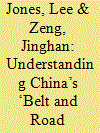

|
|
|
|
|
| Summary/Abstract |
China’s massive ‘Belt and Road Initiative’ (BRI) – designed to build infrastructure and coordinate policymaking across Eurasia and eastern Africa – is widely seen as a clearly-defined, top-down ‘grand strategy’, reflecting Beijing’s growing ambition to reshape, or even dominate, regional and international order. This article argues that this view is mistaken. Foregrounding transformations in the Chinese party-state that shape China’s foreign policy-making, it shows that, rather than being a coherent, geopolitically-driven grand strategy, BRI is an extremely loose, indeterminate scheme, driven primarily by competing domestic interests, particularly state capitalist interests, whose struggle for power and resources are already shaping BRI’s design and implementation. This will generate outcomes that often diverge from top leaders’ intentions and may even undermine key foreign policy goals.
|
|
|
|
|
|
|
|
|
|
|
|
|
|
|
|
|
|
|
|
|